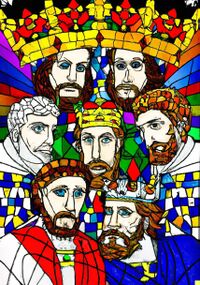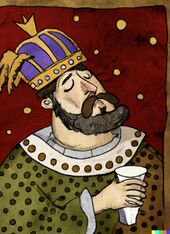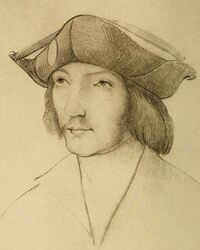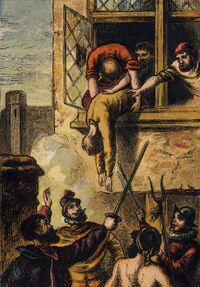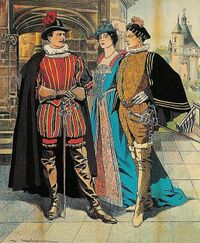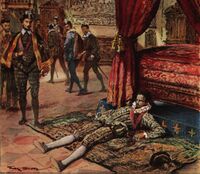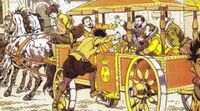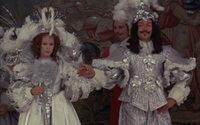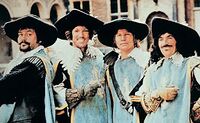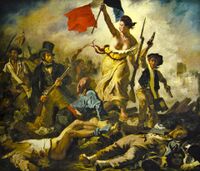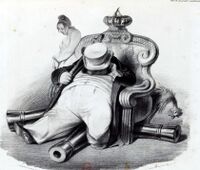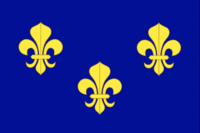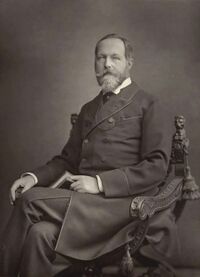House of Bourbon
The House of Bourbon is the family name of a line of French kings from 1589 to 1830. They succeeded the House of Cognac after a drunken party and gave us Louis XIV and his modest palace of Versailles outside Paris. The family then gained a reputation of lust (Louis XV), deadly incompetence (Louis XVI), child abuse (Louis XVII), gross obesity (Louis XVIII) and boneheaded stupidity (Charles X). They were then overthrown by their distant cousins, the House of Orleans, before dying out in the 1880s.
The family claimed ancestry from a 13th century son of King St. Louis IX, whose descendants, by a dynastic twist of fortune — and an assassin's knife — found themselves kings of France.[1] This allowed the Bourbons to indulge themselves as the greatest European power, able to eclipse the mighty House of Habsburg and supply a family member as the king of Spain in 1700. The Spanish Bourbons are still there to this day — despite two interruptions and four abdications.
On the margins[edit]
The Bourbons are descended from a Robert (or 'Bobbie') Carpet. His father, King Louis IX, gave Robert an assortment of land, holy benefices and a pair of trousers. As the king's sixth son, it was either that or take holy orders. Robert was given the title of Count of Clermont, a sleepy area of France where not a lot happened. However Bob impressed a certain Beatrix Bourbon, an heiress to a prosperous biscuit factory. Robert looked down on the 'trade' and kept his Clermont title.
His apathy for finance was not shared by his son Louis, who took the upgrade to Duke of Bourbon. By then, France had stumbled into the Hundred Years' War. Louis's eldest son Pierre took one for the dynasty at the Battle of Poitiers against the Black Prince. Only doves cried.
The Bourbons French-poodled along as a marginal branch of the royal family. What they lacked in prestige against the senior ruling royal cognac capets, they made up by claiming a number of titles and insinuating themselves everywhere. Eventually, most of the French aristocracy were Bourbons of one assortment or other. However, it was one particular family member whose antics endangered France's fortunes. This was Charles Duke of Bourbon, Constable of France and Keeper of the Keys to the Beaujolais Wine Cellar.
Traitor[edit]
Duke Charles owed his elevated status to a convenient marriage to another member of the Bourbons who was the heiress of a lot of prosperous vineyards and cheese production. This made Charles a rival to King Francis I of France. It only needed a few inconvenient accidents or events and Charles could bargain for more power. However, Charles's wife died and Francis ended up confiscating his rival's titles and lands as 'payment in lieu of outstanding taxes on biscuits'. Charles left France and slipped into Germany to become a soldier of fortune.
He hit the jackpot in 1525 in the Battle of Pavia against the jut-jawed Holy Roman emperor Charles V. Francis was captured and chained to a horse. Bourbon Charles was in the battle and was able to sneer with extreme arrogance as Francis scraped past. This left France in chaos and Bourbon Charles hoped the emperor would give him power there. Instead, the emperor sent him to give Pope Clement VII a mighty whack for impudently taking sides against him.
Bourbon Charles dispersed the Pope's armies and retreated to Rome. Having run out of money to pay his soldiers, he promised them they could take their reward themselves with a few trinkets when the army got to Rome. The city fell, as did Charles from a musket ball. Rome was given over to a sacking brutal enough to make a Goth or Vandal blush. Pope Clement VII hid away until the army dispersed. As for the Bourbons, they were now just custard-cream counts of whatever was left, which was not very much.
So ended the senior Bourbon line — but there were enough of them left to keep stirring the pot.
Going Protestant[edit]
The Bourbons kept intermarrying to keep their hands on family heirlooms. They were still classified as 'princes of the blood', an ancient ritual where family members drank vials of each other's bodily fluids at exclusive social functions with the French royal family.
This filial solidarity shattered when some of the Bourbons adopted Protestantism. Though conversion was usually claimed to be on religious grounds, the French Protestants or 'Hugh No Goes' (Huguenots) were not shy at breaking up and looting Catholic churches to 'destroy Papism'.
The leading Protestant Bourbon was Antoine, Count of Vordemont and the Marquis of the Velodrome. A keen cyclist, Antoine had also become King of Navarre by marriage. This kingdom had once ruled a territory straddling the Franco-Spanish border, but the southern half had already been gobbled up King Ferdinand of Aragon and Castille earlier in the 16th century. What was left of 'French' Navarre consisted of a few cow sheds, but a crown is a crown — and an important badge to flash if you wanted access to grander royal circles.
And regarding the French monarchy: The last effective French king had been Henry II, who had died in 1559 during a joust when he got the 'pointy end' rammed into his visor. The next king, Francis II, is best-known as the husband of the feisty Mary Queen of Scots. An awkward teenager, Francis and his three even younger brothers were under the thumb of his mother, Queen Catherine de Medici, and her court astrologer, quack doctor and gynaecologist Nostradamus. He had predicted that France would collapse into a civil war unless Queen Catherine remained in charge and he got a regular income.
Losing My Religion[edit]
Francis II died in 1560 from an earache. Mary Queen of Scots was sent back to Scotland, as her passport had expired. The new French king was Charles IX. Antoine had expected a senior role in a regency government, as Charles was a bratty kid with even worse manners. But Antoine was in a tricky position: His younger brother Louis (also a fierce Protestant) was in gaol as a rebel and the rival House of Guise (a non-Bourbon dynasty) had managed to get themselves into a position of power at the royal court. They did this on a platform of ultra-Catholicism and burning the Huguenots out of France. Antoine repudiated his wife, his family, and his Protestantism. But his newfound rosary did him little good. Though once again considered a 'loyalist' to the monarchy, Antoine marched against his former co-religionists and was killed by a musket ball.
Antoine's son Henry had been brought up as a Protestant in Navarre by his mother Queen Joan. Since he was only nine when his father died, the leadership of the French Protestants rested with his uncle Louis Prince of Conde. Henry re-affirmed his Protestantism, which was going to cause a problem if, by the usual accidents of fortune, he became the next living (male) heir to the French crown. Queen Catherine decided that young Henry could be perhaps 'persuaded' to switch faith like his father if there were a tempting enough prize. That would be her daughter Princess Margaret. A wedding was set for Paris in 1572. French Catholics and Protestants would be invited. However, the Protestants didn't read the small print that said 'expect to be massacred if he remain a heretic'. This is indeed what happened. The marriage still went ahead, with Henry forced to convert to Catholicism with the threat of death. He did. For now.
The Wars of the French Hooray Henries![edit]
For the next few years, Henry was a pretend Catholic in Paris. France had a new monarch. King Henry III was stronger than his brother Charles, but still had to share power with his mother, the Queen-dowager Catherine. The Bourbon Henry managed to slip out of Paris, then reversed his forced Catholic conversion and became a Protestant again. His wife remained a Catholic, but diplomatically shuttled between her brother's court and her husband's to paper over the cracks. When Henry's only other surviving brother Francis (originally Hercules) died in 1584, this left Bourbon Henry as heir apparent — and still determined to remain a Protestant.
This situation brought on a War of the Henries, a three-legged war with Bourbon Henry and his cousin Conde Henry (son of Louis Prince Conde) on one side, Henry Duke of Guise representing the Catholic League (Death to all heretics!) and King Henry. Because Henry III hadn't excluded Bourbon Henry from the succession, the Catholic League suggested Henry III was a closet Protestant himself. Tempers flared, collars were ruffled and Henry Duke of Guise was assassinated on the king's orders. When Conde Henry succumbed to illness before he could die in battle, it left two Henries[2] — who reconciled; recall that Henry III's domineering mother had just died. All Bourbon Henry had to do was to go to mass. He refused. A few months later it was the king who died violently when he was stabbed to death by a fanatical priest.
The price of power[edit]
Bourbon Henry now became King Henry IV, the first of the Bourbon monarchs. He was still King of Navarre too, but Paris was now occupied by the surviving Guise-controlled Catholic League. They came up with their royal alternative, Henry IV's Catholic uncle Charles and proclaimed him king. Inconveniently for the Catholic League, Charles was in Henry's 'protective custody' and unable to claim the French crown. The French civil war had already attracted the interest of a number of outside parties, including Queen Elizabeth I of England and Philip II of Spain. Liz backed Henry ('he was a prod') whilst Phil supported the Catholic League.
When Charles (as 'Charles X') died in 1590, the Catholic League scrabbled around to find an alternative. The Catholic League again suggested Charles ('Charles XI') would be a good candidate, and that it was about time France had a new ruler who was 100% Catholic. Philip of Spain had his own candidate, his niece Princess Isabella Clara. Yet her claim came via her mother Elisabeth, now as dead as her younger brothers Francis, Charles, Henry and Francis (part deux) — and France disallowed succession via the female line.
Whilst his enemies were debating about who should be their ruler, Henry IV managed to consolidate his French Protestant base. He then boldly switched back to Catholicism — but at the same time guaranteed religious freedom for the Huguenots. Perhaps no one was fooled, but France had had 30 years of civil war, that accomplished nothing but increase the power of the Habsburg family. France had sunk as low as it had languished back in the 15th century in the Hundred Years War.
The war still took a few more years to wind down. It didn't officially end when the last Catholic League army surrended in 1598. The Guises had grudgingly accepted the situation and declared their fealty to Henry IV. This wasn't enough. Henry had by now divorced his wife Margaret, as there was no chance of an heir. Instead, he married a Medici (a distant cousin of his mother's). The couple pumped out five children in relative short order, with two of them the all-important sons. All seemed to have been settled, dynastically and statewise for Henry.
Yet rumours that Henry was still a secret Protestant didn't go away. That he had allowed the Huguenots to retain their religious freedom was proof enough of the king's persistent heresy. It was enough for one fanatic to kill the king. In what seemed like a complete fluke, King Henry was stabbed whilst his carriage was held up in a Parisian traffic jam. The assassin was captured and executed. The new king would be a child ruler again.
One for All![edit]
The next Bourbon king was Louis XIII. This Unlucky Thirteen was only nine when his father died. The Queen-dowager, Marie de Medici, was effectively Queen Regent, shutting out any other Bourbons like the Condes from that honour. This lasted until 1617, when Louis, experiencing 'growing pains', banished his mother from France and executed her favourites.
This King Louis is the one of the Three Musketeers, an era of over-dressed men with long hair and billowing trousers swashing and buckling their way across France. In those books, the Musketeers' chief enemy is Cardinal Richelieu and his henchmen and henchwomen. In reality, Cardinal Richelieu was an effective de facto ruler of France. Internally, he cut the power of the French nobility (and blew up their castles if they dissented). The same treatment was given to the Huguenots in southwestern France who had been allowed to maintain an autonomous state-within-a-state at La Rochelle. The city was taken and the English driven off when they tried to support their co-religionists.
Richelieu's greatest triumph was against the Spanish and against the Holy Roman Empire. French soldiers were victorious in battle as, perversely, a Catholic priest successfully backed Protestant Sweden over the Catholic Habsburgs. Louis took the plaudits but was otherwise unengaged in military matters. He married a Spanish Habsburg called, confusingly, 'Anne of Austria'. Unambiguously, four children in a row were stillborn. Only in 1638 did a son survive to grow up as Louis XIV.
The Sun King[edit]
Louis XIV became King of France in 1643. He was five years old at the time. Considering the mortality survival rates for even children born with a silver service shoved in the their gobs, Louis remained king for over 70 years.
The Sin King[edit]
A bout of sudden deaths in the Bourbon monarchy brough little Louis to the French throne in 1715. He was the third king in a row to become king whilst still a child.
Help America and Go Broke[edit]
In a break with tradition Louis XVI was an adult when he succeeded his grandfather as king of France. Louis is best known for his marriage, support for the United States against the detestable English and losing his head.
Death and exile[edit]
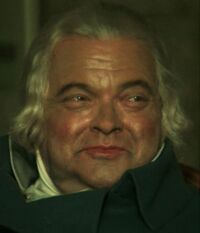
After Louis XVI was executed in 1793, the throne of France was empty. For those who had fled France because of the revolution, the next king was Louis XVII — except that he wasn't a free agent but a prisoner. His uncle, Fat Louis, proclaimed himself regent, but he wasn't in France, so he couldn't help his nephew. Louis XVII apparently died in 1795 after suffering from abuse and neglect. The corpse was lost so in later years hundreds of men would claim to be the missing king.
Though Louis XVII did a minimum of ruling, he got to keep the Roman numeral. Thus, Louis the Fat became King Louis XVIII. He had wisely fled to England, trusting the British navy would keep him secure. They did. It wasn't until 1814 that Louis XVIII got back to his country and officially became king. He had to run away in 1815 when emperor Napoleon I came back for an encore on the world stage. Louis came back again and requested that he would have Napoleon shot. The British refused to hand him over so Louis and his regime had to be content on shooting a few of the emperor's marshalls instead.
France was now supposed to be a state akin to Britain with a constitutional monarch and a national assembly of sorts. The Bourbons reluctantly accepted this arrangment but in all other cases wanted to revert back to the pre-1789. The French Revolution had been a bad dream, blamed on over ripe brie.
Louis died in 1824. His immediate heir was his younger brother Charles, an absolute extremist as King Charles X. He chose to narrow the existing electoral franchise down to a few select aristocrats and embark on military adventures, at least outside Europe. This lead to an involvement in the fight for Greek independence from the Ottoman Empire and an intervention in Algeria. This was unwise because in July 1830 there was revolution against Charles and he had best soldiers away. The rebels for their part followed a topless woman over the barricades waving a tricolour. So very French but effective. Charles X was overthrown.
Deposition and the 20-minute king[edit]
With his regime crumbling, Charles bypassed legal heir Dauphin Louis and tried to pass the crown to his only grandson, Henry (son of Charles's younger son Charles, assassinated ten years earlier). King Charles signed the abdication document but Louis refused to countersign, because Henry was only 10 years old and very annoying.
For the next 20 minutes, Louis insisted he was 'King Louis XIX'. He finally abdicated in turn. So the new king of France would be Henry V. Order was restored a few days later when Charles X's distant cousin, Louis Phillipe III, Duke of Orleans, made himself king. The Orleans branch were descendants of Louis XIV's younger brother Philip, also Duke of Orleans, and had gained a reputation for opportunistic ruthlessness. During the French revolution, Louis Phillipe's father, Louis Phillipe II, had voted to execute Louis XVI in 1793. He had done this to save the family's fortune, but it had done him no good, as he was executed in turn that same year by the now-dominant Jacobins.
Exile, again[edit]
In time, Charles X and Louis XIX would both die in exile. Henry likewise remained outside France. To the traditionalists, he was 'Henry V' with a house in France he couldn't actually visit. The royal regime of Louis Philippe was to collapse in 1848. France switched to a republic before Henry was able to gather enough supporters to reclaim the throne. The republic didn't last long and was followed by the direct rule of Napoleon III. The Bonapartists were no friends of the Bourbons.
Stubborness about a flag[edit]
In 1870, it was Napoleon III's turn to lose his throne after losing the Franco-Prussian War. Though a French Third Republic had been proclaimed as the successor of Napoleon III, it was provisional: The country was still at war with Prussia and only when that ended in January 1871 could France hold elections.
The rival monarchist factions of Henry V (or the 'Legitimists') and the Orleanists (now led by Philippe, Duke of Orleans) dominated the newly elected French assembly. Though married, Henry had no children. His declared heirs were still the Orleanists. So the ideal arrangment (from a royalist point of view) was for France to become a monarchy again with Henry and then Philippe (or his heirs) as the next rulers.
There was just one problem: the national flag. The French tricolour had been France's national flag since 1792. It had been changed back to the old fleur-de-lis only at the restoration of Louis XVIII. The Orleanists reverted to the tricolour in 1830. This became Henry's issue; to him, the tricolour meant revolution, anti-Catholicism and even escargots. Why, ancestor-and-namesake Henry IV had embraced Catholicism when there was a crown riding on it. But Henry V's influence expired on this bit of cloth.
Gone for good?[edit]
In 1883, Henry V died in exile, though he had visited Paris twice to advocate for the Good Old Flag. The Orleanist Bourbons claimed they were now the senior heirs to the phantom French throne. They have faced challenges from the Spanish Bourbon branch, in the unlikely case that France abandons elected government.
References[edit]
| |||||||||||||||||||||||||||||||||||||||||
| ||||||||||||||||
